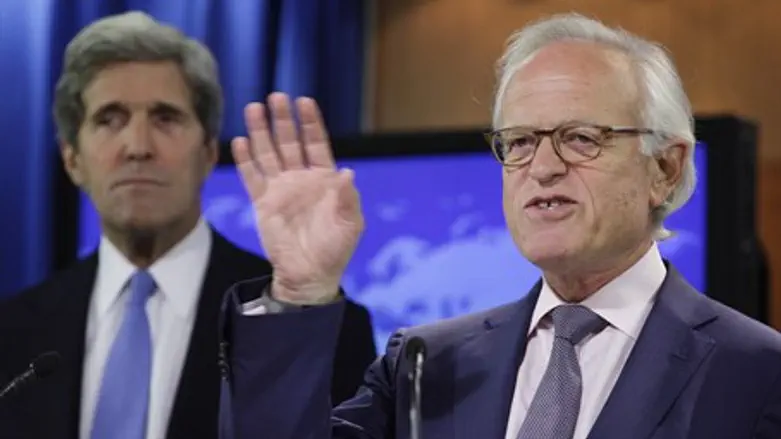
Martin Indyk, former US Middle East Envoy for President Barack Obama, has long had his impartiality regarding Israel questioned. On Wednesday, in a PBS interview, he came out with a full broadside attack targeting Prime Minister Binyamin Netanyahu.
Indyk claimed that at the 1995 funeral of former Prime Minister Yitzhak Rabin, architect of the Oslo Accords, Netanyahu politically belittled the assassinated prime minister.
"Netanyahu sat next to me when I was ambassador in Israel at the time of Rabin’s funeral," said Indyk. "I remember Netanyahu saying to me: 'Look, look at this. He’s a hero now, but if he had not been assassinated, I would have beaten him in the elections, and then he would have gone into history as a failed politician.'"
"I think even at that moment of tremendous support, a tragic moment of support for Rabin, Netanyahu was thinking, well, politically he was on the ropes before he was assassinated. He exploited that and ran against Oslo in the (1996) elections and beat (Shimon) Peres, but he only beat him by something like a half of 1%," said Indyk.
The Prime Minister's Office responded to the interview, saying, "we deny Indyk's claims completely. (What he said) never was and never happened."
But Indyk's comments were enough to provide fodder for the political left to attack Netanyahu, with the Zionist Union responding to the interview by saying it "proves what lows (Netanyahu) is able to reach. Two days after the horrible murder of a prime minister and to this day, nothing has changed, Netanyahu is only interested in Netanyahu."
Indyk has long made statements trying to discredit Netanyahu. Many of these comments have come in spite of Indyk's having been tasked as Obama's negotiator in the peace talks from 2013 to 2014, which were eventually torpedoed by the Palestinian Authority (PA) as it made a unity deal with Hamas.
Just two months ago in November, Indyk claimed that back in 1996 during Netanyahu's first term in office he was ready to give up the Golan Heights to Syria for "peace."
Indyk has a long history of attacking and blaming Israel. He is vice president and director of foreign policy for the Brookings Institute think tank in Washington, the main foreign funder of which was revealed to be Qatar, which is also the main financial backer of Hamas.
"Playing extremist right-wing fears"
Obama's ex-envoy had more criticism for Netanyahu in the PBS interview on Wednesday, saying that he plays "to his right-wing constituency. ...He knows what excites them, and he knows what they fear."
"I think he was really playing to his constituency in a way that went over the line. You saw him do it again in the last minutes before this most recent election, and he came very close to the line over here as well."
Accusing Netanyahu of racism, he added: "certainly in the White House with an African American president, he crossed the line by saying that the Arabs were coming out in droves to vote. There is that part of him that plays with populist extremism on the right."
Indyk's comments refer to Netanyahu's statements during the March elections, in which he called on nationalist voters to go vote given the unusually high turn-out among the largely anti-Zionist Arab sector, which he indicated was organized by foreign funded leftist NGOs.
Netanyahu quickly backtracked and apologized for the comments after the elections.
Obama tried to dump Israel
Indyk also spoke about Obama's approach towards Israel, and revealed that he intentionally tried to distance from the Jewish state.
"President Obama had a theory of the case, which was that George W. Bush had embraced Ariel Sharon and then Ehud Olmert, and there was no daylight between the United States and Israel, and that hadn’t produced a positive result."
"In the meantime, the relationship between the United States and the Muslim world was in the toilet, so the president believed that he needed to rebuild the relationship with the Muslim world, hence the Cairo speech, and by doing so, and by putting some daylight between the United States and Israel, currying favor with the Arabs and the Muslims would enable him to actually help Israel," said Indyk.
The ex-envoy admitted that "it was a wrong theory of the case, as he would come to discover, because by sending a signal to Israel that he was distancing himself from Israel, by not going to Israel after Cairo - don’t forget he went to Turkey, Saudi Arabia, Egypt; he didn’t go to Israel - for Israelis, the combination of not visiting and the speech sent them a very strong signal that he didn’t like them."
"After 16 years of (Bill) Clinton and Bush, of unalloyed affection, the Israelis really didn’t like that. They turned against him in that moment."
But according to Indyk, the problem was not Obama's sudden change of American policy in giving his close ally the cold shoulder, but rather that Israel was offended by the way he was trying to warm up to its enemies while giving clear signs that the US no longer supports Israel the way it used it.
"What was wrong with the theory of the case then was that once he lost the Israelis, he couldn’t move the Israelis, because he didn’t have the trust that Clinton and Bush had, and if he couldn’t move the Israelis, then the Arabs had no use for him. The Arabs don’t want him to turn against Israel; they wanted him to deliver Israel. And if he is going to deliver Israel, he’s got to have a close and strong relationship of trust with the Israeli people, if not with the Prime Minister. It took him a long time to appreciate that."